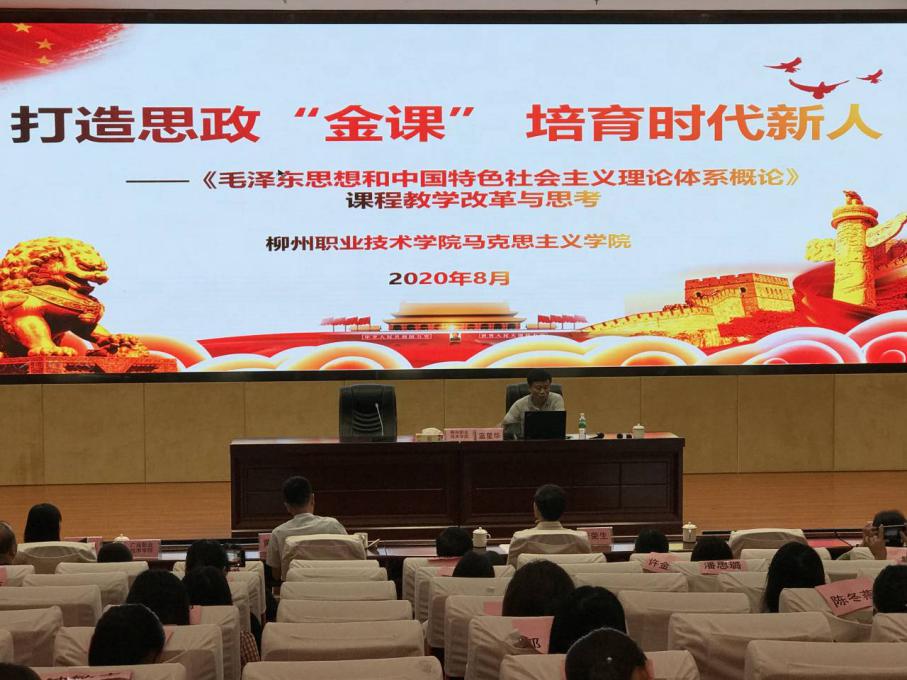School of Marxism
The School of Marxism of Liuzhou Vocational & Technical College is a secondary institution under the direct leadership of Party Committee of the College. In January 2018, the School established the first School of Marxism in higher vocational colleges in Guangxi based on the existing ideological and political theory teaching department.
The School of Marxism is responsible for the teaching of ideological and political theory courses and mental health education courses of the College; organizes and coordinates the management of the ideological and political education research and the construction of Marxist theory disciplines; takes charge of overall planning for construction of the ideological and political theory courses, and carries out ideological and political education in coordination with all departments of the College; takes charge of ideological and political theory courses, and construction and training of ideological and political teacher team; and is responsible for the teaching in the school of young Marxist.
Up to now, the School of Marxism has two teaching teams, i.e. the teaching team of ideological and political theory courses and the teaching team of higher vocational students’ mental health education courses. Under the former, three course centers are set up, including “Introduction to Mao Zedong Thought and Theoretical System of Socialism with Chinese Characteristics”, “Ideological & Moral Cultivation and Fundamentals of Law”, and “Situation and Policy”. The School has LVTC outstanding talent studio, LVTC social science institute, moral education institute and other school-level institutions. It is responsible for the teaching of Party courses in the Party School of the LVTC Committee of CPC and the school of young Marxists, and provides guidance for student organizations and clubs such as Sunshine Psychological Association.
The School has now 19 full-time teachers, including 1 doctor and 13 masters; 12 associate professors or teachers with higher professional title (inclusive of 3 professors); and 3 national secondary psychological consultants.
The School puts a new premium on teaching reform and innovation, and has made great achievements in course construction, teaching and scientific research. And an ideological and political theory course system is built in the form of “Theory + Practice”, “First Classroom + Second Classroom”, “In-Class Teaching + Extracurricular Teaching”, “Traditional Teaching + Information Teaching, and “Mandatory Courses + Optional Courses”, so as to constantly improve the teaching mode and innovate its implementation method. Over years of practice, exploration and summary, the “3344211” teaching mode has been established. The Research and Practice of “3344211” Course Construction Concept and Teaching Mode Innovation of Ideological and Political Theory Courses in Higher Vocational Colleges project has been approved as the college students’ ideological and political education project in autonomous region. By reform and continuous innovation using modern education technology, the School has owned three region-level excellent courses, i.e. “Introduction to Mao Zedong Thought and Theoretical System of Socialism with Chinese Characteristics”, “Ideological & Moral Cultivation and Fundamentals of Law”, and “Mental Health Education of Students in Higher Vocational Colleges”.
The “Course Ideological and Political” Collaborative Education Center project with the School of Marxism as the main participant has been approved by the working committee of colleges and universities and the Department of Education in the autonomous region. The School became the cultivation and construction project unit of “Three All-round Education” demonstration schools throughout the region in 2018. Taking the talent cultivation as the school’s start point and target on the basis of “Morality Education”, this project builds a “Great Ideological and Political” collaborative education system, establishes and improves the collaborative education working system, and sets up a “1+10+10” collaborative education mechanism. “1” means the establishment of a collaborative education center responsible for coordinating and directing the implementation of the school’s “Three All-round Education” works; the first “10” means the establishment of 10 collaborative education working groups under the center; and the second “10” means focusing on promoting 10 collaborative education quality improvement projects, including: management education, course education, scientific research education, practice education, cultural education, network education, psychological education, service education, college-funded education and organization education.
In the past five years, the teachers of ideological and political courses and psychological courses have won two first prizes, three second prizes, two third prizes and one excellence award in the previous basic teaching skills competition for young teachers of ideological and political courses in Guangxi’s universities and colleges and the “Wonderful Lesson” competition. In the basic teaching skills competition of young teachers of ideological and political courses in Guangdong, Guangxi, Hainan, Jiangxi and Yunnan, one won the first prize and one won the third prize. One teacher, on behalf of Guangxi, won the third prize in the teaching demonstration activity of young teachers of ideological and political courses in national higher vocational colleges. Several teachers were praised by experts from the Ministry of Education and the Department of Education in the autonomous region. And, the ideological and political and psychological courses have become the most popular courses among students in this School.
All faculty and staff of the School of Marxism will never forget their original aspiration, keep their mission firmly in mind, and move forward to promote the construction and teaching reform of ideological and political theory courses and mental health education courses, continuously improve the teaching quality, effectively enhance students’ sense of gain to the ideological and political theory courses, improve students’ mental health level, and cultivate a new generation of young people capable of shouldering the mission of national rejuvenation.


